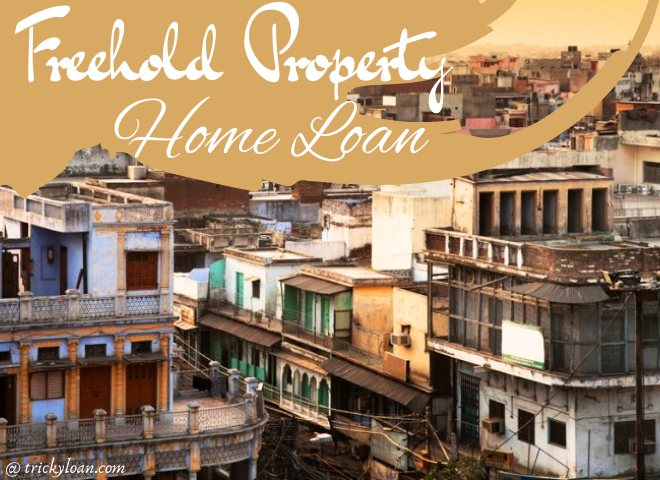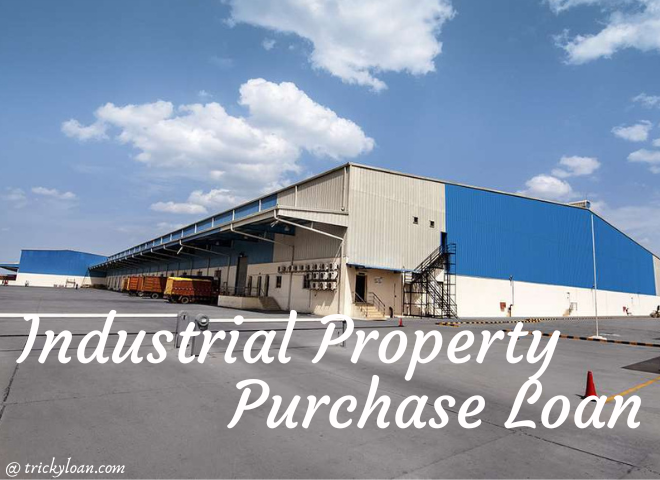At Tricky Loan, we understand that owning a home is a significant financial investment for many people. For most of us, buying a home is the biggest purchase we’ll ever make, and the cost of a property can be overwhelming. That’s where home loans come in – they allow you to finance your dream home, without having to worry about upfront costs.
If you’re considering a Home Loan on a Freehold Property, you’ve come to the right place. In this guide, we’ll take you through everything you need to know about home loans on freehold properties, including how they work, the benefits and risks, and the eligibility criteria. We’ll also provide you with some tips on how to get the best home loan deal for your needs.
Generally all Banks / HFCs are willing to give Home Loan on Freehold Property. This is because it is considered a safe investment. Not only the registration of freehold property is done but the expectation of an increase in its value is very high.
What is a Home Loan on Freehold Property ?
A home loan on a freehold property is a type of loan that allows you to borrow money from a lender to purchase a property that you own outright. In other words, if you already own the property without any liens, the property is said to be “freehold,” and you can use it as collateral to secure a loan.
The lender will assess the value of the property and use it as collateral to secure the loan. This means that if you’re unable to repay the loan, the lender can take possession of the property and sell it to recover their money. However, once you’ve paid off the loan, you own the property outright, and it’s no longer used as collateral.
Banks / HFCs are generally more willing to give a Home Loan on Freehold Property than a leasehold property. This is because it is considered a safe investment. Also, the mortgage process of freehold property is very easy. The possibility of an increase in the value of the freehold property is very strong, due to which Banks /HFCs are able to give maximum loan on the freehold property which is around 90% of market value.
- Advantages of Home Loans on Freehold Property
There are several advantages of taking out a Home Loan on Freehold Property. Firstly, you have complete ownership of the property, which means you can use it as you wish. You also have the freedom to make any changes or modifications to the property, such as renovations or extensions.
Secondly, Home Loans on Freehold Property typically have lower interest rates compared to other types of loans. This is because the loan is secured against the property, which reduces the risk for the lender.
Thirdly, Home Loans on Freehold Property offer tax benefits. You can claim tax deductions on the interest paid on your home loan, which can help you save money on your taxes.
- Disadvantages of Home Loans on Freehold Property
While Home Loans on Freehold Property have several advantages, they also have some disadvantages. Firstly, the loan is secured against the property, which means that if you’re unable to make the monthly payments, you risk losing your property.
Secondly, the loan repayment period is typically long, which means that you’ll be paying interest for a longer period of time. This can result in higher interest costs over the life of the loan.
How Does a Home Loan on Freehold Property Work ?
A home loan on freehold property works much like any other type of loan. You’ll need to apply for the loan with a lender and provide them with information about your financial situation, including your income, expenses, and credit score. The lender will use this information to determine your eligibility for the loan and the amount you can borrow.
Once your application is approved, the lender will disburse the loan amount to you, and you can use it to purchase the property. You’ll then need to repay the loan in regular instalments, which will include both the principal amount borrowed and the interest charged on the loan.
How to Apply for a Home Loan on Freehold Property ?
Applying for a Home Loan on Freehold Property is similar to applying for any other type of home loan. The first step is to find a lender who offers Home Loans on Freehold Property. You can do this by conducting an online search or by contacting a mortgage broker. Once you’ve found a lender, you’ll need to provide them with your financial and personal information, including your income, credit score, and employment status.
The lender will then evaluate your application and determine whether you’re eligible for the loan. If you’re approved, the lender will provide you with a loan offer, including the loan amount, interest rate, and repayment terms. You can choose to accept the loan offer or negotiate for better terms.
Tips & Tricks for Borrowing a Home Loan on a Freehold Property
If you plan to buy a freehold property and need to take out a home loan, there are several steps you should follow:
Step 1: Determine Your Eligibility
Before applying for a home loan on a freehold property, it is essential to determine your eligibility. You should consider your credit score, income, and employment status. Lenders usually prefer borrowers with a good credit score and stable employment and income to minimize the risk of default. You may also need to provide evidence of your income, such as pay slips, tax returns, or bank statements.
Step 2: Shop Around for the Right Lender
Once you have determined your eligibility, the next step is to shop around for the right lender. You should consider the interest rates, loan term, and fees and charges of each lender. Lower interest rates can save you thousands of dollars over the life of the loan, while longer loan terms may result in lower monthly payments but higher total interest charges.
Step 3: Understand the Terms and Conditions of the Loan
Before signing any loan agreement, it is essential to understand the terms and conditions of the loan. You should review the repayment schedule, prepayment penalties, and default provisions. The repayment schedule outlines the frequency and amount of your loan payments, while prepayment penalties may apply if you pay off the loan early. The loan agreement should also outline the consequences of default, including foreclosure and repossession.
What is Freehold Property ?
Freehold Property is property that is “free from hold” of any entity other than the owner. Therefore, the owner of such property receives free ownership forever and is free to use the land for any purpose as per local regulations. The sale of a freehold property does not require consent from the State / Local Authority and therefore requires less paperwork which makes the freehold property more expensive than the leasehold property.
There is no restriction on the right of the owner of the inherited freehold property to transfer the property further. In a free hold property, there is no extra charges or taxes to the property’s full title. A freehold property can be transferred very easily by registration of the Sale Deed.
- Freehold Land Title
Freehold land title is a type of property title whereby the owner of the land holds it forever (free from hold). In other words, there is no time limit for freehold land ownership for the zamindar and his beneficiaries.
- Can the government acquire freehold land ?
Yes ! Under the Land Acquisition Act, the government is empowered to acquire any type of private land for the purpose of industrialization, infrastructure development or urbanization by giving appropriate compensation.
- Why is there no depreciation of freehold land ?
This is because the useful life of freehold land is considered unlimited. Other long-term assets, such as furnishings, equipment, etc. have limited useful lives.
Rights of owners of freehold properties
Freehold property can be inherited. There is no restriction on the right of the owner of the property to move it which can be easily transferred by registration of the Sale Deed. When you buy a freehold property, you own that property – be it a House, Flat, Floor, Factory or Shop. If the property is an apartment, the owner of the house becomes a shareholder in the property. You get the right to stay in that house as long as you want and you are also entitled to make necessary changes in it.
Home Loan on Double | Triple | Multiple Freehold Units
Some HFCs provide home loan on multiple units built on same floor. In such flat bankers prefers for minimum area of 50 yards (450 square feet).
Home Loan on Bachcha Flat
This is a small flat builds in stilt parking. In Sale Deed, ground floor is mentioned as stilt parking. If they construct any residential unit on it, technically banker counts it ground floor. Due to this lending institute don’t gives home loan on this. But, Some HFCs provide home loan on such property. Certainly, rate of interest will be slightly higher than usual.
Home Loan on Stone Slab (Kadi Pathar) Roof
Banks / HFCs don’t offer home loan on Stone slab or Kadi Patar roof property. In such case, Bank / HFCs will consider this property for plot purchase. In valuation of property, building value is taken as nil. Bank / HFCs gives loan to make purchase (Plot) and later gives construction loan on same property. It is to make property live-able and safe.
Home Loan for Fitting and Fixture
In Freehold approved location, you can get home loan, up to 140% of Sale Deed (Subject to Bank’s / HFCs exposure on loan remains 75% – 90% of property’s market value). Payment up to 80% – 90% of Sale Deed is done by Bank / HFCs in the name of seller and remaining payment is made in name of buyer on account of “Fitting and Fixture”.
Home Loan on Freehold Property without Map
In order to give a Home Loan on Freehold Property, All Banks or HFCs must ask the applicant for the approved sanction plan or an approved map of the property. This is an important document.
Before giving the sanction letter to the applicant, the Bank/HFC checks with the appraiser on its panel to see if the property has been constructed in accordance with the laws and approved maps. If the property is not constructed as per the approved map, the Bank/HFCs may reject the loan application.
However, there are many properties in Delhi-NCR where an approved map is not available due to various reasons, such as the property is too old, the approved map is missing etc.
If you are buying a property where an approved plan or approved map is not available, most Banks or HFCs may reject your loan application. However, there are some Banks or HFCs that offer Home Loan on Freehold Property even without a map with some of their terms and conditions.
Required Documents for Home Loan on Freehold Property
To apply for a Home Loan on Freehold Property in India, borrowers need to submit certain documents to the lender. These documents may vary depending on the lender’s policies and the borrower’s profile, but some common documents required are –
Required Documents for Salaried
Main Applicant
- Photo
2. Pan Card Copy
3. Aadhar Copy
4. Current Residence Proof
5. Employee Id Copy
6. Latest 3 Months Slip
7. Latest 6 Months Bank Statement Salary Account
8. Latest One Year Bank Statement of Saving Account
9. Latest 2 Years Form-16, Part-A&B or ITR with Financial
10. Running Loan Account Statement
11. Processing Fee Cheque
Co-Applicant
- Photo
2. Pan Card Copy
3. Aadhar Copy
4. Relationship Proof with Main Applicant
Property Documents
- Minimum 13 Years ownership transfer chain
2. Agreement to sell copy
3. Own Contribution Proof
4. Seller KYC
Required Documents for Self Employee Business Owner
Main Applicant
1. Photo
2. Pan Card Copy
3. Aadhar Copy
4. Current Residence Proof
5. Business Registration and Business Address Proof
6. Latest 12 Months GST Return Copy
7. Latest 6 Months Bank Statement Current Account
8. Latest One Year Bank Statement of Saving Account
9. Latest 3 Years ITR with Financial
10. Running Loan Account Statement
11. Processing Fee Cheque
Co-Applicant
- Photo
2. Pan Card Copy
3. Aadhar Copy
4. Relationship Proof with Main Applicant
Property Documents
- Minimum 13 Years ownership transfer chain
2. Agreement to sell copy
3. Own Contribution Proof
4. Seller KYC
Required Documents for Self Employee Professional
Main Applicant
- Photo
- Pan Card Copy
- Aadhar Copy
- Current Residence Proof
- Professional Education Proof
- Business Registration and Business Address Proof
- Latest 6 Months Bank Statement Current Account
- Latest One Year Bank Statement of Saving Account
- Latest 2 Years ITR with Financial
- Running Loan Account Statement
- Processing Fee Cheque
Co-Applicant
- Photo
- Pan Card Copy
- Aadhar Copy
- Relationship Proof with Main Applicant
Property Documents
- Minimum 13 Years ownership transfer chain
- Agreement to sell copy
- Own Contribution Proof
- Seller KYC
FAQs
What is a Leasehold Property ?
A leasehold property is one where the owner only has the right to use the property for a set period, usually between 99 to 999 years. When you buy a leasehold property, you own the property for the duration of the lease, but you must pay ground rent to the freeholder who owns the land. Additionally, you may need to seek permission from the freeholder to make any significant changes to the property.
What are the different types of home loans ?
There are various types of home loans available in the market, including fixed-rate loans, adjustable-rate loans, interest-only loans, and more. Fixed-rate loans have a fixed interest rate throughout the loan’s life, whereas adjustable-rate loans have a variable interest rate that changes depending on market conditions.
How do I qualify for a home loan ?
To qualify for a home loan, you will need to meet certain criteria set by the lender. This includes having a good credit score, a stable income, and a low debt-to-income ratio. You will also need to provide proof of income, employment, and assets.
How much can I borrow for a home loan ?
The amount you can borrow for a home loan will depend on various factors, such as your income, credit score, and the value of the property you want to purchase. Typically, lenders will offer a loan amount that is up to 80% of the property’s value.
How do I choose the right lender ?
When choosing a lender, you should consider factors such as interest rates, repayment terms, fees, and customer service. It is also essential to compare offers from different lenders to ensure that you get the best deal.




